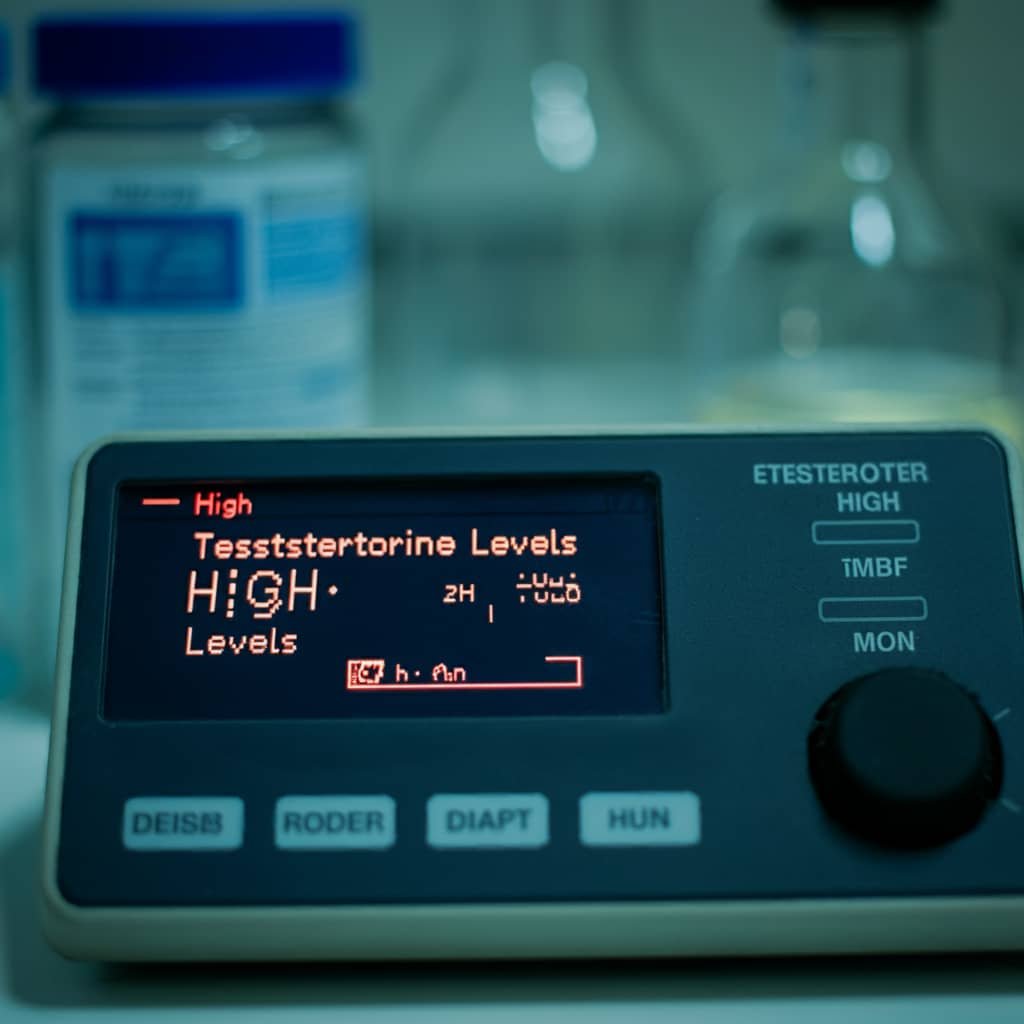Have you ever felt a surge of anger, only to feel drained and irritable afterward? Little do many men know, anger can significantly impact their testosterone levels.
Anger affect testosterone levels in men, and understanding this connection is crucial for overall well-being. While anger might seem like a fleeting emotion, its long-term effects can be detrimental to your health and vitality.
In this article, we’ll delve into the science behind anger and testosterone, learning how anger affects testosterone levels in men, and exploring how these two powerful forces interact and how you can manage your emotions to optimize your hormonal health.
How does anger affect testosterone levels in men?

Anger triggers a chain reaction in the body that can impact your testosterone levels. When you get angry, your body enters “fight or flight” mode, releasing stress hormones like cortisol.
Here are the main ways anger impacts testosterone levels in men:
-
High levels of cortisol in the body
When cortisol levels spike due to anger or stress, testosterone levels often take a hit.
High cortisol can block or reduce the production of testosterone, which means that constant anger or stress could lead to lower testosterone over time.
For Nigerian men who face daily hustle stress like traffic jams in Lagos yelling at other drivers or long waits at government offices, this repeated exposure to anger and stress can keep their testosterone levels consistently low, leading to fatigue and reduced vitality.
-
Short-Term Testosterone Surges
In moments of sudden anger, such as a heated verbal exchange over a parking spot or a disagreement at a local bar, testosterone levels may surge briefly as part of the fight-orflight response.
This temporary rise can make a man feel aggressive or charged up to confront the situation.
For example, a man might feel a rush of energy during an argument, but after the situation resolves, that spike can dip sharply.
This after events drop can leave him feeling drained, moody, or even regretful about what happened, which may disrupt his emotional balance and overall energy level.
-
Long-Term Stress
Repeated anger and stress that may come from managing demanding work hours or constant family obligations, keeps cortisol high and testosterone low.
Picture a man who deals daily with a chaotic job followed by the pressures of family responsibilities.
This kind of stress leads to chronic anger, which takes a toll on testosterone over time.
This drop in testosterone can appear as constant tiredness, poor sleep quality, or a noticeable dip in enthusiasm for activities like exercise or social events, which are even important for maintaining balanced testosterone levels.
-
Disrupted Hormonal Balance
Another way anger affect testosterone levels is that it can throw the body’s hormones out of balance, especially when it becomes a routine reaction to daily challenges, like dealing with power outages or frustrations with customer service.
This continuous state of stress redirects the body’s resources to handle the immediate crisis, disrupting normal testosterone production and causing hormonal imbalance.
This can then lead to reduced motivation and feelings of being overwhelmed, making it tough for men to maintain the drive for physical activities or hobbies that keep testosterone levels healthy.
Short-Term vs Long-Term Effects of Anger on Testosterone

Understanding how anger affect testosterone levels in the short and long term can help men better manage their emotions and overall health. These are some of the effects of anger on testosterone;
Short-Term Effects on Testosterone
-
Temporary Spike:
Anger can cause an immediate rise in testosterone as part of the body’s natural hormonal response. For example, a man might experience this during a heated argument with a neighbour or in a competitive game of football.
-
Post-Anger Drop:
After the initial surge, testosterone levels can fall quickly, making men feel fatigued or irritable. For instance, after an argument with a colleague, you might feel worn out and unmotivated to even apologize once things settle down.
-
Momentary Aggression Boost:
Short-term increases in testosterone can lead to more assertive or even aggressive behaviour. This can be seen when someone reacts harshly to being cut off in traffic or during a dispute at a local market.
-
Quick Hormonal Rebalance:
If anger is something that doesn’t last and not a regular occurrence, testosterone levels usually return to normal without long-lasting effects.
Long-Term Effects on Testosterone

-
Chronic Low Levels of stress:
Regular anger and stress, such as ongoing conflicts at home or persistent financial worries, can elevate cortisol levels that suppress testosterone. Over time, this can lead to chronic fatigue and low energy.
-
Reduced Libido and Mood Shifts:
Continuous anger can reduce testosterone levels long-term, impacting libido and overall mood.
A man who is constantly stressed about work or economic pressures might notice less interest in intimacy or social interactions.
-
Physical and Emotional Fatigue:
Extended low testosterone can result in reduced muscle strength, increased body fat, and a general decline in motivation.
This can make it difficult to stay physically active, affecting one’s ability to engage in exercise or even simple daily activities.
-
Mental Health Decline:
Sustained low testosterone due to long-term anger can contribute to feelings of depression and anxiety, making it harder to find joy in hobbies or family time.
-
Health Consequences:
Prolonged low testosterone levels can impact muscle mass, weight gain, and overall mood, making it harder for men to maintain a healthy, balanced lifestyle.
How can men manage anger to maintain healthy testosterone levels?

Managing anger is crucial for overall well–being, mental health, and balanced hormone levels, including testosterone.
Uncontrolled anger can lead to spikes in stress hormones that negatively affect the body, but adopting healthy strategies can mitigate these effects.
By incorporating simple and relatable methods into daily routines, men can effectively manage their emotions and protect their testosterone levels.
Here are practical strategies for men to better regulate emotions and reduce stress:
-
Physical Activity:
Regular exercise can help burn off excess energy and reduce stress. For example, taking a jog around the neighbourhood or joining a local football game can help release pent-up frustration and promote better mood regulation.
-
Deep Breathing and Relaxation:
Simple breathing exercises can quickly calm the mind during tense situations. Try taking deep, slow breaths when you’re caught in traffic or facing a challenging conversation at work to keep anger in check.
-
Connecting with Friends and Family:
Spending quality time with loved ones helps shift focus away from anger and creates positive feelings. Sharing laughs with friends over a game of chess or a weekend barbecue can improve your mood and stabilize hormones.
-
Mindfulness and Meditation:
Practicing mindfulness helps you stay present and manage emotional reactions. For instance, taking a few moments to meditate in the morning before a busy day at the office can set a peaceful tone and reduce stress.
-
Limit Alcohol:
Reducing caffeine and alcohol intake can minimize irritability. For example, opting for a warm herbal tea instead of multiple cups of coffee can help maintain calm throughout the day.
What are the health implications of mismanaged anger on testosterone levels?

Anger affects testosterone levels, and consistently high or low testosterone levels can have significant health consequences.
Here are eight potential long-term impacts of mismanaged anger on testosterone levels and overall health:
-
Severe Fatigue:
Constant anger and stress can lead to prolonged dips in testosterone levels, resulting in chronic fatigue.
This can make even simple daily tasks feel exhausting.
For instance, a man who is constantly stressed at work or home might find himself too drained to engage in activities he once enjoyed, such as playing with his kids or exercising.
-
Reduced Muscle Mass:
Low testosterone levels over time can result in reduced muscle mass and strength.
Men who frequently experience uncontrolled anger may find it harder to maintain muscle, even with regular workouts.
This can lead to frustration and a cycle of discouragement, further fueling emotional outbursts.
-
Weight Gain and Obesity:
Anger-related hormonal imbalances can contribute to weight gain, especially around the midsection.
For most men who value physical prowess and energy, this can be discouraging.
Gaining excess weight can also increase the risk of conditions like diabetes and heart disease, which are already prevalent health concerns.
-
Sleep Disruptions:
Persistent anger can contribute to poor sleep quality.
Without adequate rest, testosterone production decreases, leading to a cycle where a man feels increasingly irritable and tired.
For example, a businessman dealing with daily frustrations might find himself waking up in the middle of the night unable to get back to sleep.
-
Reduced Sex Drive:
Long-term low testosterone often results in reduced sex drive.
This can affect relationships, leading to dissatisfaction in the bedroom.
A man who feels less inclined toward intimacy might experience frustration and misunderstandings with his partner, adding to emotional stress.
-
High Blood Pressure:
Anger that’s regularly mismanaged can contribute to elevated blood pressure, putting pressure on the body and potentially lowering testosterone over time.
A man who frequently argues with his co-workers or family may find that his blood pressure readings are higher than normal, posing long-term health risks.
-
Digestive Issues:
Constant anger and stress can disrupt your digestion and gut health, which can affect your overall hormone balance, including testosterone.
For instance, someone with a high-pressure job and ongoing anger issues might experience chronic indigestion or stomach pain, indirectly impacting his hormone levels.
-
Weakening Bone Density:
Low testosterone can decrease bone density over time, increasing the risk of fractures and osteoporosis.
This might mean that a seemingly small fall or minor accident can have major repercussions, leading to long recovery periods.
Conclusion
Today, we have learned how anger affect testosterone levels in men. We also learned that, managing your anger isn’t just about staying calm, it is about protecting your health.
Mismanaged anger can throw you off your testosterone levels, impacting your energy, mood, muscle mass, and even heart health.
However, with practical steps like stress management, deep breathing, or talking things out, you can break the cycle.
So, whether it’s dealing with everyday frustrations at work or handling tough personal situations, taking control of your emotions helps you keep your testosterone steady and supports your long-term well-being.
Also note that, being proactive about how you handle anger benefits your mind, body, and overall quality of life.
At Enthusiast Express, we are dedicated to helping men understand the importance of managing anger and its impact on testosterone levels.
Managing anger isn’t a sign of weakness, it is a powerful step toward staying healthy, confident, and in control.
Subscribe to Enthusiast Express for expert insights into men’s health, practical anger management tips, and strategies to keep your hormones balanced.
Join our community of men committed to making smart, healthy choices every day.

